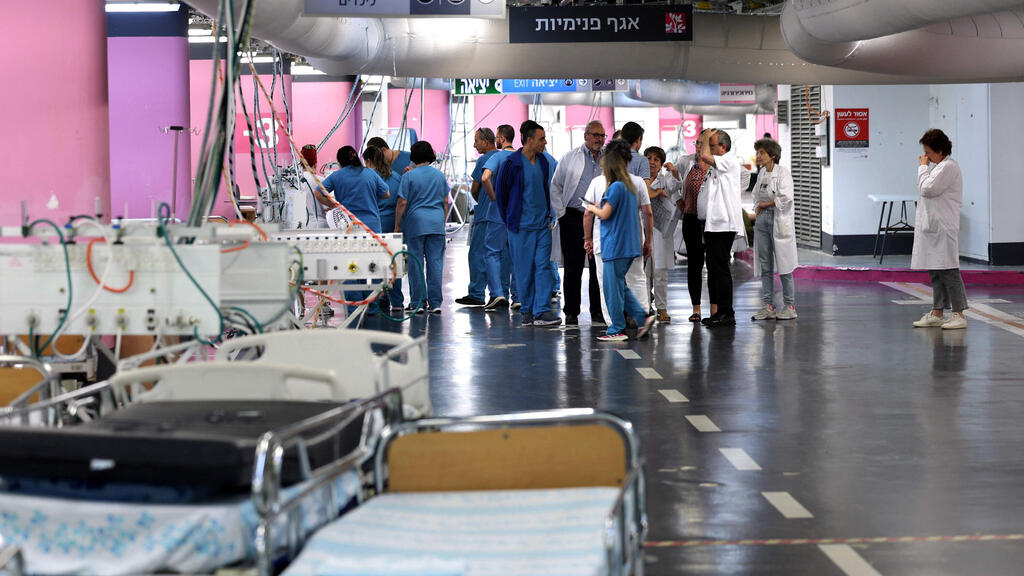Getting your Trinity Audio player ready...
Hospitals in northern Israel have moved to emergency protocols as heavy rocket barrages target the region.
Rambam Health Care Campus in Haifa and Emek Medical Center in Afula have canceled all elective procedures and non-urgent surgeries, and outpatient clinics have been suspended until further notice. Rambam has also closed its public underground parking lot to prepare for operating wards in its underground complex.
The underground hospital complex under Rambam Health Care Campus in Haifa
(Video: Courtesy)
Northern hospitals have been preparing for months for a potential escalation with Lebanon, including stockpiling supplies and medicines for a “deserted island” scenario, where they would need to operate independently without external support.
Health Ministry Director-General Moshe Bar-Siman-Tov warned last week at a health conference: “In war, unexpected things will happen. Hospitals may find themselves isolated and will have to make their own decisions. We will support them with manpower and equipment, but we are entering uncharted territory.”
Following the heightened alert, Emek Medical Center also postponed non-urgent ambulatory care and prepared to evacuate patients from upper floors to protected underground areas. The Baruch Padeh Medical Center in Tiberias announced it would discharge stable patients and cancel elective surgeries, while urgent and oncological procedures would continue.
The Galilee Medical Center in Nahariya has been operating in protected spaces for the past year, and all its medical activities, including surgeries and deliveries, take place in secure areas.
Health services along the conflict line continue despite the risks, with medical staff braving rockets and drones to reach clinics in affected areas.
Dr. Eitan Heller, director of Clalit Health Services in Kiryat Shmona, emphasized that despite evacuations, his clinic has not closed for a single day. "Travel is our biggest challenge,” says Heller.
“Once we’re here, we’re in a protected facility. But despite the war, we haven’t closed for a single day. Staff members arrive via organized shuttles or by car. The clinic itself is in a fortified area, two floors above ground, and offers a full range of services including pharmacy, laboratory, X-ray and basic medical care. We also provide specialized consultations in orthopedics, and ear and eye care.
“Patients usually arrive before noon, although we’re open until 2 p.m. We also serve many who are scattered across the country by sending our teams to them, and we conduct numerous telephone and digital consultations, even outside regular hours,” he added.
2 View gallery


Emek Medical Center in Afula is prepared tp move patients to a protected underground area
(Photo: Nahum Segal)
Tzipi Cohen, director of Maccabi Health Services in the Upper Galilee-Golan region, said her teams have remained committed, working daily from Majdal Shams to Kiryat Shmona and Safed, despite the dangers.
“We continue to operate all clinics, from Majdal Shams to the southern Golan Heights, including Kiryat Shmona, Safed, Hatzor and Katzrin. Our teams are superheroes who leave their small children each day to ensure uninterrupted care for our members, despite the risks of traveling in these conditions.”
Although many residents have evacuated Kiryat Shmona, people still come for treatment daily, Cohen noted. “We’re still here, providing care to those who chose to stay. Some are afraid and have moved to quieter areas, but we are ready for every scenario.”
“We’ve consolidated our clinics and are fully equipped with family doctors, pediatricians, nurses, social workers, and emotional therapists. We’ve prepared for this escalation and are coordinating closely with the Ministry of Health, local authorities and the Home Front Command,” Cohen said.
Dr. Heller added that their teams have been preparing all year. “Now we’re just reviewing protocols and doing refreshers to ensure we’re ready for anything.”






